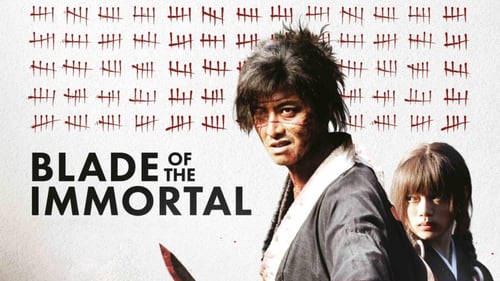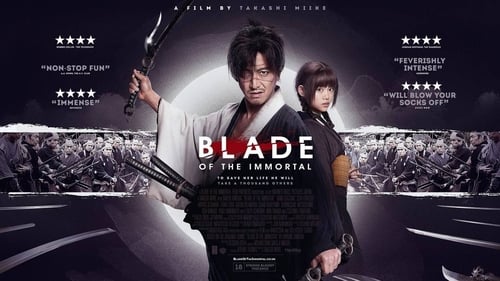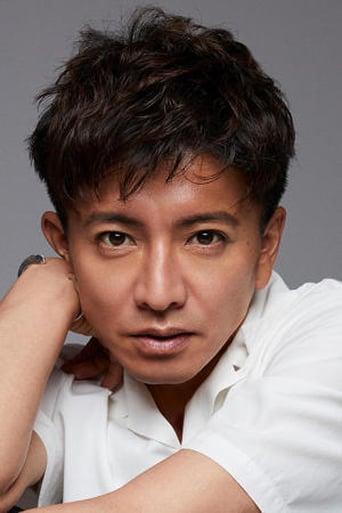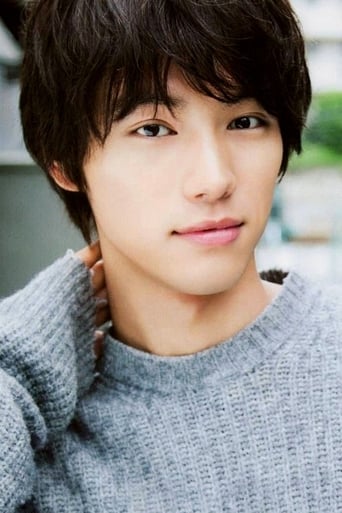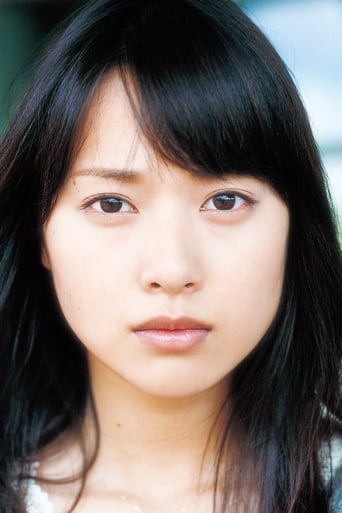TeenzTen
An action-packed slog
ChicDragon
It's a mild crowd pleaser for people who are exhausted by blockbusters.
Rio Hayward
All of these films share one commonality, that being a kind of emotional center that humanizes a cast of monsters.
Nicole
I enjoyed watching this film and would recommend other to give it a try , (as I am) but this movie, although enjoyable to watch due to the better than average acting fails to add anything new to its storyline that is all too familiar to these types of movies.
JJPoytress
I had no prior knowledge of this being based on a manga until after I did a little more research about it, so watching this movie purely from being a fan of film; and Japanese films in this case, I thought it was a great Samurai action film with really good characters. The acting is wonderful, the story is great, and production value is top notch.
Mark Turner
If you're not familiar with the works of director Takashi Miike then by all means become so. This Japanese director has been making feature films since 1995 and is recognized as one of the most influential directors of his generation. His first major splash in the US came with the film ICHI THE KILLER, a yakuza film known for its brutal depiction of violence. Here we are 22 years later and Miike has just unleashed his 100th film as a director. No small feat, especially or perhaps in spite of his not being a member of Hollywood. And BLADE OF THE IMMORTAL is an amazing film to behold.Based on the manga comic of the same name the movie tells the story of Manji, a Samurai on the run after killing a corrupt official and his bodyguards. Unfortunately he's done so in front of one of the guard's wife who goes mad. Now he feels obligated to protect her. It isn't long before bounty hunters track him down, kill the woman and launch Manji into a fit of rage with him attacking all 100 of them. Mortally wounded an 800 year old nun approaches him and gives him new life by placing magical bloodworms inside his body, providing him with immortality.50 years pass and Kagehisa Anotsu and the Itt-ry clan are making their way across Japan and giving fencing schools the option of either joining them or being eliminated. One of the schools they approach refuses and the school's leader is killed in front of his young daughter Rin. Rin escapes and swears revenge. Seeking help she learns of Manji and approaches him to help her and he refuses.That all changes when Rin is attacked by Sabato Kuroi, a member of the Itt-ry clan, who approaches her with her mother's head mounted on his shoulder. Manji comes to the rescue and agrees to be Rin's bodyguard.As well as training Rin, Manji protects her by fending off attacks from other various members of the Itt-ry clan. Each battle displays his weaknesses to both Rin and his attackers and each one uses those weaknesses to their advantage. While Manji is immortal it doesn't mean he can't be severely wounded.As this is going on more plotlines are moving forward, in particular and offer delivered to Kagehisa Anotsu from the Shogunate to train the leader's warriors. Before doing so he plans on visiting a dojo leader on Mt. Takao. But as with most stories neither plot moves in a straight line and crosses and double crosses on both sides occur leading to a climactic battle involving one of the largest and most impressive swords battles ever captured on film.If all of this weren't enough there are two subplots taking place here as well. The first is the revenge motif on display not just from Rin but from Anotsu as well. One segment has him explain why he's doing all of this. The second is the question of immortality. Some would think it a blessing but here we see it as a curse. To live forever and to watch others fall while you carry on, to have next to no purpose in life and yet be forced to live on watching others move forward it the burden that Manji bears. When he meets another immortal, a warrior who has lived 800 years and wants nothing more than death, he's forced to confront his reason for existence.Miike's use of extreme violence is well on display here but far less than has been seen in his previous films or for that matter in any number of gore drenched horror films in recent years. While blood may flow at various times it isn't the gushing display seen in most movies these days. Here the violence ties into the story and the times it takes place in, a time when razor honed swords wound their way through flesh like a hot knife through butter. This was the way of life for a warrior in Japan then and Miike captures it with flair.But the story is not based on fact, the immortality should have given that away, but on a story that melds comic book mentality with legends of long ago. Call it a disturbing fairy tale with hints of dark comedy thrown in for good measure. Miike takes these elements and mixes them with his own style to create a fascinating movie.On top of a great story this movie looks amazing. The cinematography here, much of it taking place outdoors and with a vast number of extras in huge battle sequences, is a sight to behold. And those fights involve stunt work and blade avoidance that flawless.There may be movies more familiar with movie fans or renters released this week but for me this was the best being offered. Dubbed for those who hate subtitles, make sure you look for this one.
politic1983
Over-the-top and excessive are two phrases that can be pointed in the general direction of director Miike Takashi: the high-octane montage that greets us to the Dead or Alive trilogy; the comical blood-splatting of Ichi the Killer; the extensive battle scene of 13 Assassins. All are examples of pushing cinema to its limits of taste, morality and viewer boredom threshold. The third is an interesting one. His late Nineties and early new millennium films were often notable for their excessive violence, however, this violence was often creatively twisted into place alongside other, often stronger elements. The nature of relationships and power balances between characters in Ichi the Killer; the slow-building tension of Audition; the nostalgia of Nostalgia. With the budgets more limited, Miike would seemingly earn his stripes and get creative, but now with the budgets and hype much greater, has excess simply become self-indulgence?
Based on the manga, Blade of the Immortal, the supposed ninety-ninth film of Miike's now one hundred not out career, starts with Manji (Takyu Kimura) with a price on his head, fighting off a hoard of bounty hunters, while trying to protect his younger sister. A troubled, masterless samurai, Manji duly fights them all off, but at the cost of numerous wounds. Pouring blood worms into his wounds, a mysterious old woman heals Manji, giving him the curse of immortality, though the same cannot be said for his sister.
Switching forward fifty years, Manji has been living a desolate life alone and un-aged, but is sought by the young daughter of a dojo master killed by the Itto-ryu: a school determined to resurrect the skill of sword-fighting as a necessary evil, unlike the simple physical education it has become. Wary at first, Manji vows to help Rin (Hana Sugisaki) get her revenge, largely, it seems, because she resembles his young sister. Bloodshed ensues as the Itto-ryu (and others) challenge Manji to battle one-by-one, soon discovering his immortal powers.
The Itto-ryu also seek to become the Shogun's fencing school of choice, but find themselves deceived by the Shogun's army resulting in a three-way stand-off between Manji and Rin, Anotsu (Sota Fukushi, the head of the Itto-ryu) and the Shogun's vast forces and some other side story characters thrown-in again at the end to further the silliness. What results is a perhaps overly-long sword fight between hundreds of men and a couple of women in the vein of 13 Assassins.On balance, there is probably more bad than good with Blade of the Immortal. Over-indulgence perhaps the main problem. While we expect this to be a slash-fest with arms chopped-off galore, when this is the main crux of the film, it becomes a little tedious. An obvious comparison, Ichi the Killer centred around two main characters and their sadomasochistic relationships with those who hold power over them. The gore is an amusing and fun distraction, rather than the main draw. Here, Miike chooses to go for long, drawn-out fight scenes that offer little after the first thirty seconds other than just adding to the body count. Little is particularly developed in terms of characterisation, other than Manji coming to terms with immortality being a fate worse than death and his explanation to Rin that revenge only leads to bloodshed - something Miike adequately shows. Villain Anotsu delivers a surface-level monologue midway through the film, but beyond this, the audience is given few clues as to whether to love or loath him. Extended fight scenes is nothing new to Miike, with 13 Assassins having the mother of all battles, but this was an epic battle to which the film had been building, rather than a extended slash-fest, having already had some earlier slash-fests. The film looks pretty in parts, with some good cinematography and the special effects fit the bill. But as a bigger, more anticipated release than perhaps his films in the Nineties received, the bigger scale has come at the cost of creativity. His peer Shinya Tsukamoto still works to limited budgets, but still creates some inventive and interesting works. Manji is referred to as the Hundred Man Killer and Miike is now a one hundred production director. But with his recent trajectory, his career seems not so much immortal, rather a slow death.
rogerdarlington
Apparently Japanese director Takashi Miikwe has a hundred movies to his credit hut I've only previously seen one of them: "13 Assassins". Like "13 Assassins", "Blade Of The Immortal" is a stylish bloodfest - if that's not an oxymoron - set in the Edo period of Japanese history (1603-1868), but this film tells a much more personal story, namely the relationship between a tormented samurai called Manji (Takuya Kimura) and the girl to whom he becomes bodyguard Rin who reminds him of his dead sister Machi (both played by Hana Sugisaki).The reason for Manji survivability - and also his despair - is that, as explained in a black and white prologue, he has been infected by bloodworms which heal his wounds so that he cannot die. The growing friendship between Manji and Rin reminded me of the film "Leon" but the deathtoll in this tale is many times more with the blade of the title slashing into bodies and cutting off limbs with great speed and fluidity.This is not a film to everyone's taste and at 140 minutes it is somewhat overlong, but for me it was the perfect cinematic escapism between two challenging meetings on a cold December day.






